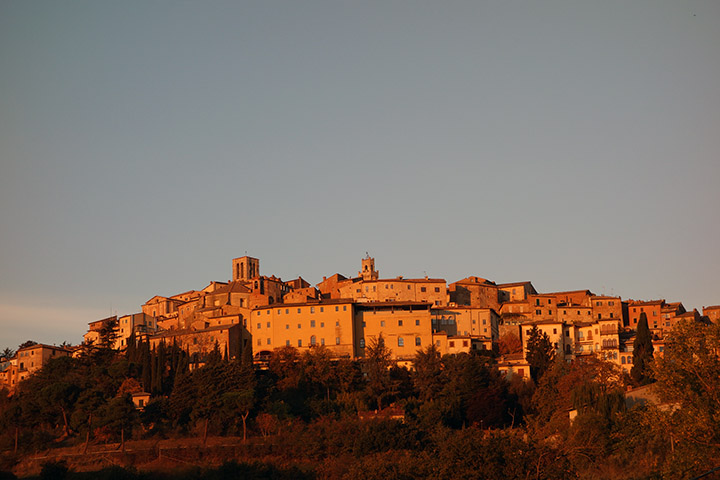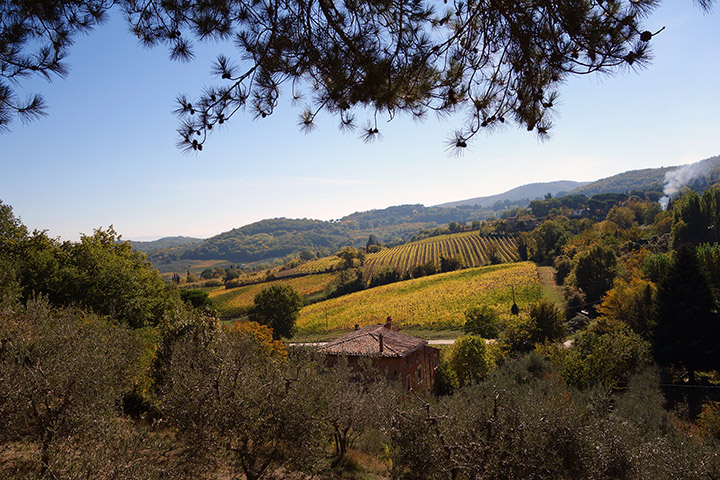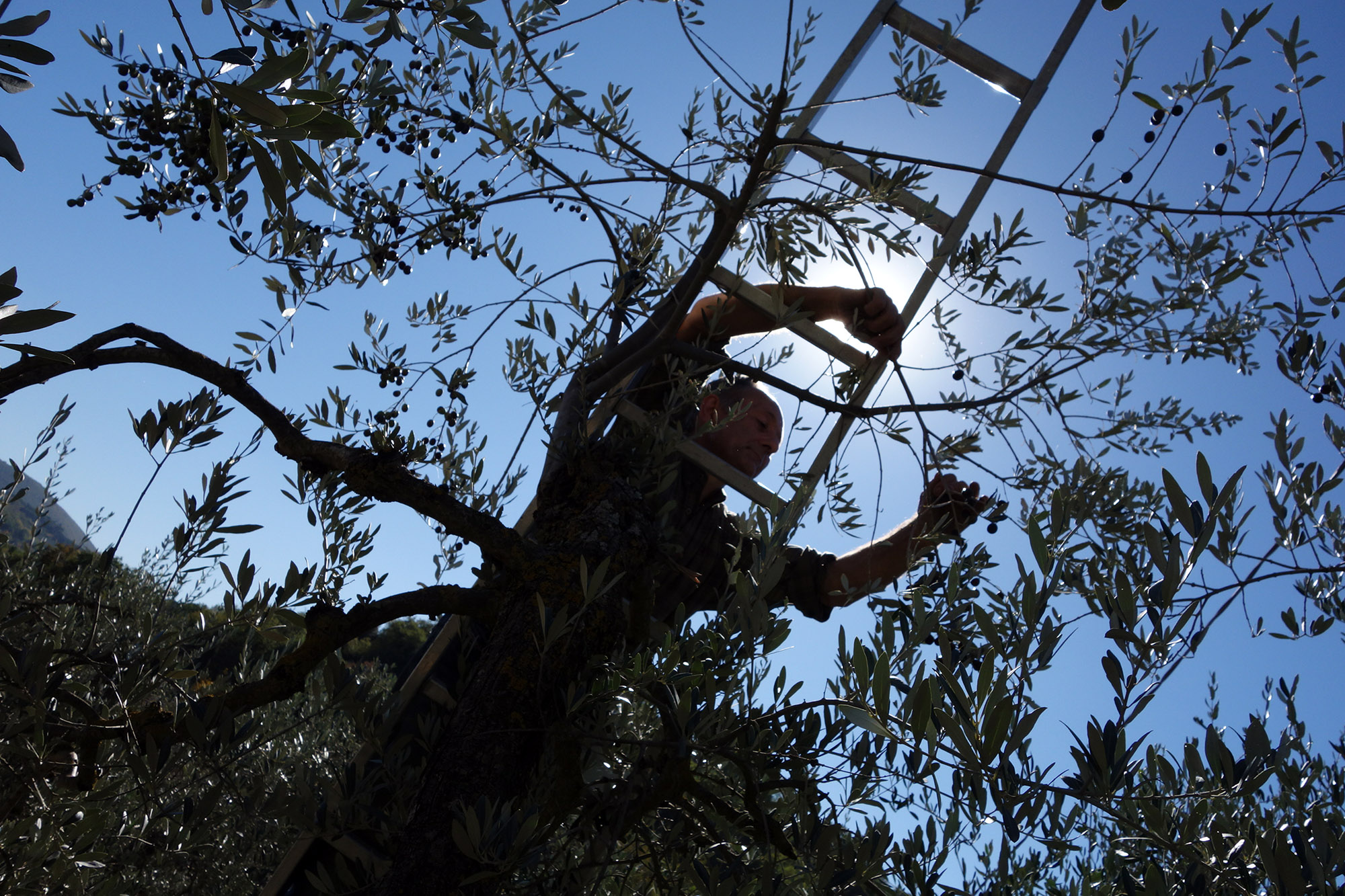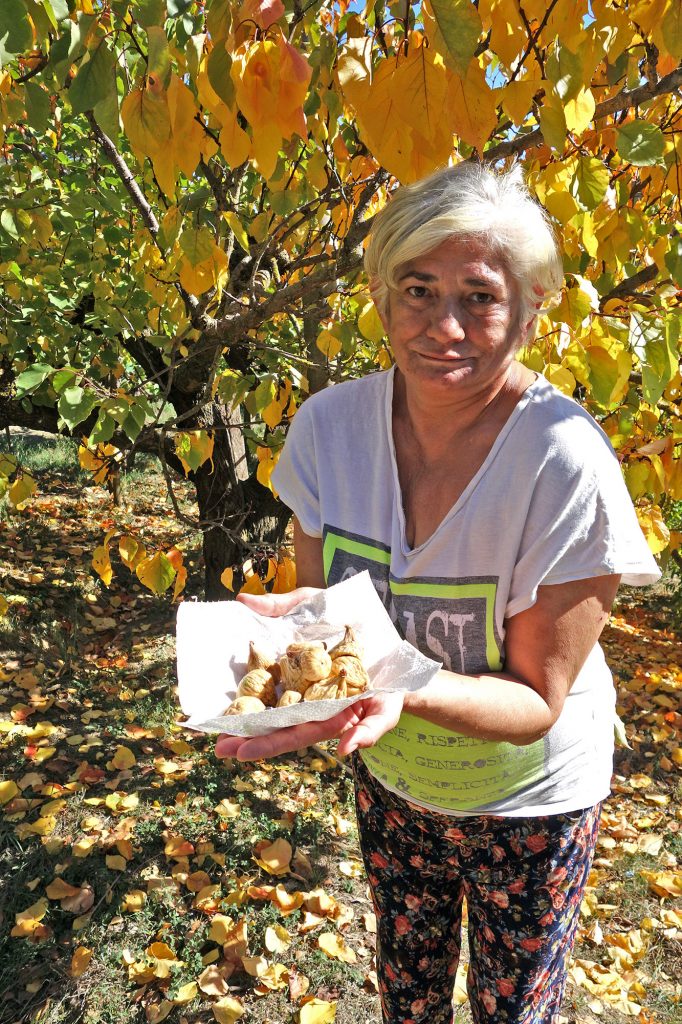
Introduction
Tiring of leapfrogging about the globe, barely unpacking, living out of suitcases and rarely getting to know one place before zipping off to the next, Lynne and I discovered and embraced travel guru Rick Steves’ concept of planting yourself in just one perfect place, getting to know the folks, immersing yourself in the culture and sliding into local life — becoming what Steves calls “a temporary local.”
Thus, we find ourselves on this extended fall break in residence at a 200-year-old restored Italian farmhouse nestled on the eastern flanks of the 14th century walled Tuscan hilltown of Montepulciano, famous for its wine and olive oil.
Indeed, it is this latter product that draws us here this autumn. For this October is the time of the olive harvest, and as luck might have it, our little villa, “La Casina Toscana,” perches on a steep south-facing hillside immediately adjacent to the olive grove and adjacent farmhouse of Claudio and Violetteria, two hard-working 60-something farmfolk, whose daily rural life spreads out below us like a little opera.
I am not a travel writer; but I am a writer who is traveling. With all this Tuscan life unfolding before my pen and camera, how can I keep from writing and shooting?

What is Claudio doing?
Out in the early morning chill in his steep-sided olive grove, the wiry little farmer appears to be talking to his olive trees — whitish green-gray in the October sun — muttering commands, issuing orders.
Then gazing about like a military captain taking stock of his forces, he begins digging furiously, then tenderly, as if with a babe in arms, transplants a little olive sapling.
It has been so dry. Dry and hot. How is he olive crop, we ask? Poor, we are told, when we met up last night with old Pier Luigi, the linen shopkeeper up in the village. Half the crop, perhaps, and some olive farmers, nil. Still, the harvest — the celebration thereof — goes on. Salut! This is Italy.
Claudio, with his several-acre farm in the shadow of Montepulciano, could make a small fortune, selling this quaint villa for agro-tourism (the new gentrification of Italy?) But he will never leave. Nor would I, in his shoes.
The Sounds of Rural Italy
The sounds of Tuscany are striking for their distinct sense of place.
Claudio’s rooster stuns me with his fierce morning bugle call. Awake! Awake Now!
Chickens cluck, doves and pigeons mew and coo, a distant farm dog barks insistently across the olive grove studded valley. Businesslike starlings cackle from their perch on the old-fashioned TV antenna atop the tiled roof of Claudio’s farmhouse. Italian finches and sparrows chuckle and chirp conversationally to each other. Now, without preamble, the farm rooster lets loose another fanfare — startling in its decibel level.
At precisely 8 a.m. the church bells from the citadel above break out into a clamorous announcement of the new day. For 30 solid seconds, they peal bang-bong-bang-bong back and forth like competing pugilists — until one boxer gives up and the other finally tires of this sport too.
And the valley below the sun-spangled Tuscan hill town falls again into its morning peace and silence.
This Italian soundscape is also distinct for that there is not — no traffic rushing, no car horns blaring, no airplanes roaring, no phones ringing, and absolutely no technology reminding you that it is not 1400 AD when this walled Tuscan citadel was built by the local nobles to ward off the invading Florentine kings to the north or the greedy Romans from the south.

Harvesting the olives
Now, an amazing thing happens; the kind of human exchange every true journalist learns to cherish. Claudio is out in the olive grove with a ladder, scaling the trees, his harvest bag on his left hip, as he reaches into the branches for the sun-ripe black fruit.
Can I make photographs? How to approach without being boorish or like some invasive tourist?

The farmer’s wife, an energetic silver-haired woman with lively young eyes, spots me and beckons. She wants to meet the newcomer from the USA, and waves me over to see the crop.
My name is Jock I tell her in terrible Italian. And you?
Violetteria…she tells me, and it takes a dozen tries before I am able to roll my Rs even vaguely close to being correct, prompting her to laugh musically with delight.
In spite of the fact that we can’t speak each other’s language, we communicate — oohing and ahh’ing over the basket of fresh-picked olives, pointing and waving as the farm wife demonstrates how she uses a home-made olive rake, while, from his perch on the ladder, her husband picks olives, one by one. One can only wonder at how labor intensive this work is.
I make more photos of Claudio in the trees. Maybe it is time to go now, I think to myself. But Violeterria has vanished. Yes, time to go, I tell myself.
But something tugs at me. No. Wait a minute. Something else is about to happen.
And it does.
Here comes the farm wife with a double handful of something, a gift, a two-fisted clump of fresh figs from an enormous fig bush. Violeterria won’t let me leave without this offering. Grazie Mille! And a hug. Yes. This is Italy and it is permitted. Even expected.
I head up the path between the gnarled olive trees, camera in one hand, fresh figs in the other.
A dopo! See you later! She waves me off. I can’t stop grinning.

